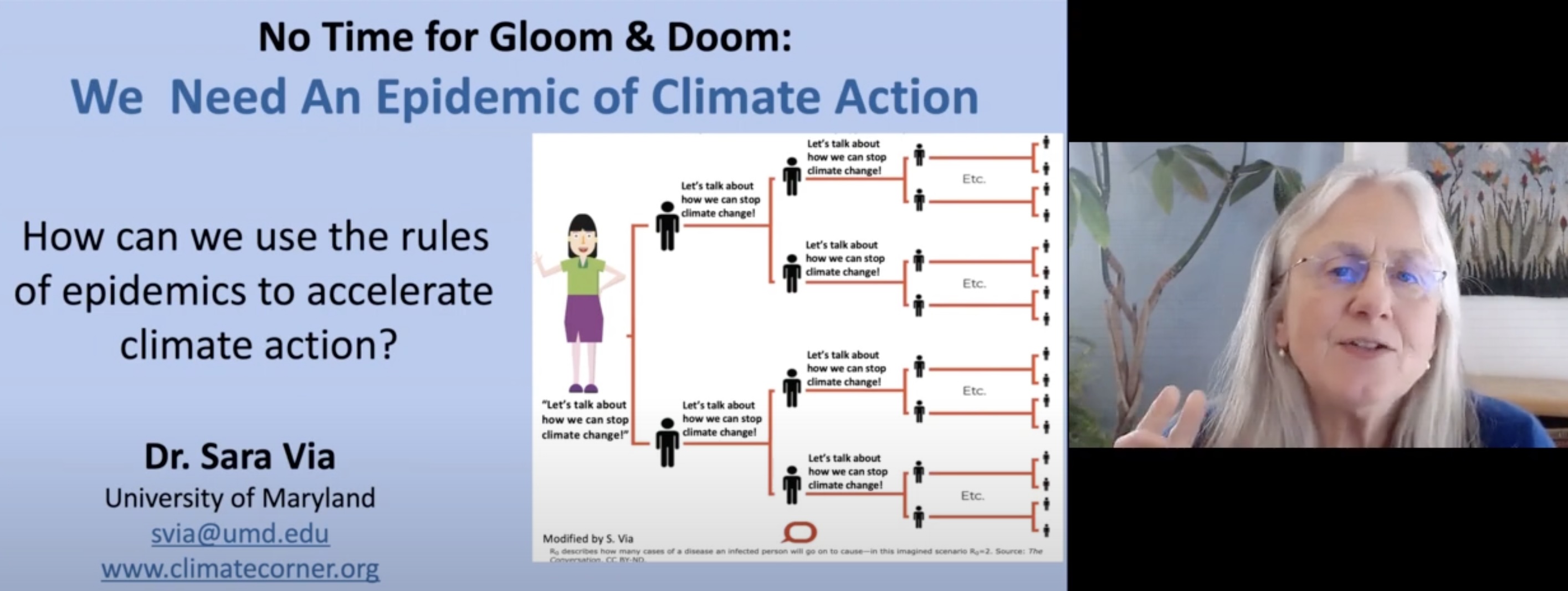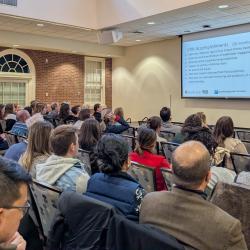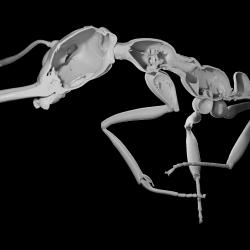7 Ways You Can Help Curb Climate Change
In recognition of Earth Day, UMD Entomology Professor Sara Via shared her tips for taking on this grand challenge.
If you ever felt a chronic fear of environmental doom, also known as “eco-anxiety,” you’re not alone. Over the course of two decades, University of Maryland Entomology Professor Sara Via became increasingly concerned about climate change while teaching an introductory course on ecology and evolution.
“Each year I updated my lectures to reflect the human impacts on ecosystems,” Via said. “As time wore on, I became more and more worried about climate change and thought, ‘I really need to do something about this.’”
Via has since discovered that climate action is a powerful antidote to fear. As a University of Maryland Extension climate specialist, she stresses the need for systemic change—coupled with individual actions—to reduce carbon emissions and limit global warming.

No individual is responsible for our current climate crisis, but collectively we have the power to make a difference, Via explained. Even small actions can create a ripple effect, encouraging others in your social circle to start caring about climate change.
“Nobody can do everything, but what really matters is for people to do whatever they can and as much as they can,” said Via, who also produces a webinar series, e-newsletter and blog on climate action.
In recognition of Earth Day, Via offered seven science-backed actions that individuals can take right now to curb climate change and confront eco-anxiety.
- Finish—or freeze—your food.
Food waste is a major contributor to climate change because it decays in landfills and produces methane, a potent greenhouse gas. According to the U.S. Environmental Protection Agency, over one-third of food produced in the United States is wasted. This accounts for 170 million metric tons of greenhouse gas emissions, which is on par with the annual emissions of 42 coal-fired power plants.
Most of this food is wasted in our own homes. Composting your food scraps can help, but Via said to be careful not to overdo it.
“Don’t regard composting as a license to waste food,” she said. “When we waste food, we waste all the water, fertilizer, energy, land and labor used to grow that food.”
To prevent food waste, Via recommended being mindful about how much food you can realistically use before it spoils.
“Don’t buy more food at the store than you are confident you are going to use,” she said. “And if you’re in a position to have a freezer, that can allow you to avoid a lot of food waste because you can freeze almost everything you can’t use right away, including eggs and milk.”
- Consider skipping that steak.
Reducing or eliminating red meat is an important climate solution. The livestock and agriculture sector accounts for 37% of human-caused methane emissions, with meat and dairy cattle contributing 62% of that amount and pigs contributing 14%.
Via noted that you don’t have to switch to a plant-based diet overnight to make a difference. Just start small and keep working at it.
“When people factor in a few more plant-based meals or substitute beans or lentils for meat in a casserole, it gives them an opportunity to develop a taste for it,” Via said. “It’s a process, and it’s a way of learning how to live a little differently.”
- Talk about climate change with friends and family.
A 2022 study in Nature Communications found that up to 90% of Americans underestimate the extent to which others are concerned about climate change.
“The authors referred to this as a ‘false social reality’ because even though people are worried about climate change, they don’t think anybody else is worried, so they don’t talk to other people about it,” Via said.
Via recommended talking to friends, family and neighbors about the actions you’re taking to curb climate change, even if it’s a casual mention of a home improvement project to save energy. Doing so can motivate others to take similar steps.
“It has been clearly shown that when someone puts solar panels on their roof, their neighbors are more likely to put solar panels on their roof,” Via explained. “That is how societies change: by people doing things differently, which then becomes the norm.”
- Boost your home’s energy efficiency.
Homeowners might want to consider upgrades that will save energy—and money—in the long run. Via suggested looking into storm windows (which add insulation and are cheaper than replacing windows), induction stoves (which are less polluting than gas stoves) and heat pumps (an eco-friendly alternative to furnaces and air conditioners).
“Everybody does themselves a favor when they make their home more energy efficient because that dramatically reduces the amount of energy used, so of course it saves a ton of money,” Via said. “I’ve made a lot of energy-efficiency improvements and I can see the benefits on my electric bill.”
If you’re a renter, Via recommended talking to your landlord about the potential cost savings of making these upgrades. And if that fails, she suggested a return to the basics: turning lights off when leaving a room, turning down the thermostat and unplugging energy-hogging electronics, like game consoles and chargers.
- Leave those leaves in your yard.
Good news for those with lawns: When it comes to the environment, less yard work is often more. Leaf blowers disturb important hibernating insects in your yard and pollute the air.
“Leaf blowers are the most inefficient piece of yard equipment,” Via said. “A little statistic that might horrify you is that one hour of use of a leaf blower is equivalent to driving a Toyota Camry 1,100 miles.”
Via also recommended reducing the amount of grass in your yard to eliminate the need for extensive mowing, which also produces carbon emissions. Instead, consider planting native trees, shrubs and plants, which will boost biodiversity in your yard.
- Drive less.
Via suggested leaving your car parked whenever you have other transportation options, such as walking, biking or public transportation.
“Try to reduce your optional driving as much as you can,” Via said, “because that is a big contributor to greenhouse gas emissions.”
Ridesharing can help take cars off the road, and UMD has a digital platform to help you connect with other interested carpoolers.
- Support policies and politicians that prioritize climate change.
Via noted that one of the most important climate actions that you can take is to leverage your voice and your vote.
“It’s super important at the state, local and federal level to vote for people who care about climate change,” she said.
More specifically, Via recommended voicing your support for clean energy projects in your community or state—especially if they’re facing local opposition.
“One way that people have had a negative impact is by saying, ‘I don’t want to look at those windmills or turbines or solar panels in my community,’” Via said.
While anything new or different may seem intimidating at first, Via stressed that by taking the initiative to help combat climate change, we can contribute to building a better world.
“People hate change, and people think that change can only produce a world that is worse, but that’s not true,” Via said. “One thing I’ve been trying to get across is that we can build a future that is much better than the present, but it takes effort.”







